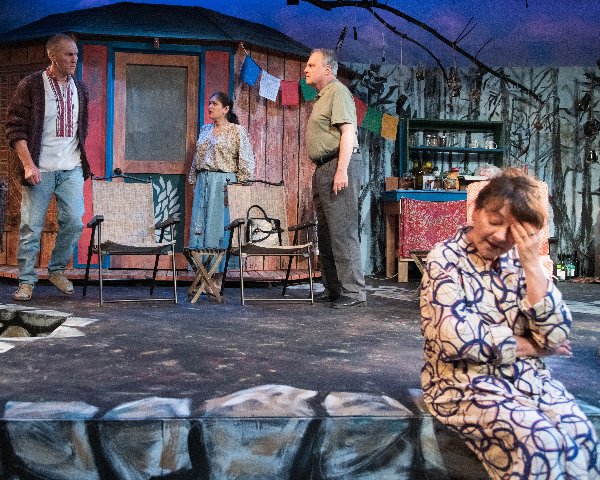The Quality of Life by Jane Anderson
Produced by Altarena Playhous
By: Victor Cordell - May 31, 2022
More and more, the United States is becoming a house divided – blue states versus red states. Profound differences in fundamental values, from civil and women’s rights to gun control, rupture the connective tissue of the body politic.
Jane Anderson’s “The Quality of Life” depicts this schism within a family, and it feels even more pertinent today than at its premiere in 2007. How “today” are family rifts resulting from moral/religious differences as well as the loss of virtually all material possessions due to a California home being consumed by wildfire?
Altarena Playhouse’s production of this biting drama, directed by Katina Psihos Letheule and with set design by R. “Dutch” Fritz, is outstanding. An amazing foursome of wonderfully-cast actors deliver remarkable and memorable performances to a provocative script that especially resonates with Bay Area audiences.
While the term quality-of-life registers with most people, its ambiguity derives from the fact that each person’s criteria for it will differ. Despite the hardship associated with Jeanette and Neil’s losing their Berkeley hills home, the playwright may be suggesting that the involuntary return to nature dictated by their current situation has regenerative and other benefits. Although some aspects of quality-of-life may be difficult to measure, most will be physical attributes such as number of sunny days a year or availability of public transport. But the socio-political differences between the two couples in the play also suggest that the emotional effect of being in an environment with people of like thinking is important.
Dinah and her husband Bill have suffered a tragedy, and Dinah feels it would be a good time to get away from their home in Ohio and reconnect with her Bay Area cousin, Jeanette. Meanwhile, Jeanette and Neil are living in an off-the-grid yurt on their charred property.
The reunion reveals love and conflict within and between the couples, each pair with their resolute philosophical views of how life should be lived. The playwright exposes a raft of issues to contemplate – faith, ecology, life cycles, renewal, bonding, and letting go. She endows her characters with distinctiveness, particularly in the nature and strength of their moral convictions.
Tension is continuously palpable from the opening scene when Bill shows his disrespect of Dinah by leafing through the newspaper while she tries to engage him in conversation. But throughout, humorous asides cool the temperature and keep the taut, serious drama from being depressing.
In large measure, the play is comprised of four character studies. Central to the narrative is Neil, whose body is failing him. An appropriately ashen Ted Barker exudes confidence as a professor who believes in his rational judgment and relishes intellectual exchange, even though his mind is made up on most issues. He may even goad an opponent just for fun.
Jeanette is portrayed poignantly by Bonnie DeChant, as one who looks like a maturing hippie. She’s earthy; she’s confident; and she’s reconciled to the loss of the physical representations of the couple’s 29 years of memories, instead displaying as art the remains of cameras, glass, and window frames mangled by 2000° heat from the fire.
Sindu Singh is Dinah, and the actress beautifully captures her somewhat subservient and timid but sincere and generous nature. She actively seeks guidance from Christ and usually follows Bill’s lead, but she is not happy with the new congregation that they’ve joined and is committed to helping Jeanette.
Finally, while CJ Smith is probably a really nice person, he performs the dogmatic, inflexible Bill to a T. Bill believes rigorously in his own righteousness and in the Christian path. He questions whether non-believers can possess morality without having a guidebook for direction. He is also troubled by the life style of Jeanette and Neil, especially pot smoking. And as a prototype of today’s clannish conservative politician, there is no problem on earth that he can’t find a way to blame on people of persuasions different from his. Like Dinah, he does have a giving side, but it derives from intrusion and dominance, not altruism.
As time passes, incidents arise that both bind and divide and raise more questions. Why do tragedies sometimes promote division rather than unity? What constitutes the sanctity of life? Is God responsible when bad things happen to good people, or does God even exist? Tempers flare and alliances are challenged. In the end, Bill offers Dinah an avocado tree, and the open question is – “What will it take to grow an avocado tree in Ohio?”
“The Quality of Life” is written by Jane Anderson, produced by Altarena Playhouse, and plays on its stage at 1409 High Street, Alameda, CA through June 26, 2022.

